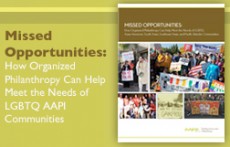It’s probably no surprise that there is a long-standing need for funding for organizations that support Asian American and Pacific Islander LGBTQ communities, but I was surprised by just how little funding these organizations get. The numbers tell the beginning of the story: in 2009 the amount of foundation funding to all LGBTQ organizations was 0.2 percent, and the amount of those resources going to LGBTQ AAPI organizations was 0.7 percent. Asian Americans/Pacific Islanders in Philanthropy (AAPIP) has produced a new report, Missed Opportunities: How Organized Philanthropy Can Help Meet the Needs of LGBTQ Asian American, South Asian, Southeast Asian, and Pacific Islander Communities by Alice Y. Hom, Director of the Queer Justice Fund (QJF). It is the first of its kind to summarize key issues facing LGBTQ API communities, document the current lack of philanthropic investment, and make funding recommendations that will benefit individual lives and strengthen AAPI communities.
Missed Opportunities is a major milestone for the Queer Justice Fund, an incubation project of AAPIP that stemmed from the National Gender & Equity Campaign. The QJF report puts into practice AAPIP’s principle of “democratic philanthropy,” which “calls on both organized philanthropy and individuals to support the development of practices that begin with the vision of communities first, and that draws on the assets of those communities as the starting place for any blueprint to maximize their potential.” In addition to being a roadmap for foundation funding, the report also serves as a useful tool for individual giving though a collective vehicle such as LGBTQ AAPI giving circles, which the Queer Justice Fund is helping develop.
As a Chinese American lesbian, I am personally familiar with how LGBTQ AAPI organizations make a big difference in individual lives. I experienced firsthand the complexities of talking directly about my sexual orientation to family members. I often hear stories of people who found the safety and support of LGBTQ AAPI organizations literally critical to their survival during the time of their coming to terms with their sexual orientation and gender identity, as well as the process of coming out to others. LGBTQ AAPI organizers have to balance sometimes urgent needs for affirmation and mentorship from individuals experiencing disconnection and homophobia with the need to work on social, cultural and educational programs and policy work that addresses more macro-level challenges.
Although these organizations are severely underfunded, they do a lot with what little they have. The current lack of funding means that LGBTQ AAPI organizations have traditionally been volunteer-led. This leads to higher levels of burnout in staff and increased turnover, resulting in less programmatic continuity and a sense of organizations always being “in crisis.” Missed Opportunities describes how capacity building and infrastructure investment will give LGBTQ AAPI organizations a more solid foundation: developing outreach and communication strategies that better reach the diversity of AAPI immigrant communities, building partnerships with other AAPI organizations working in different sectors as well as with LGBTQ organizations and other organizations focusing on intersecting issues, and seeking sustainable funding sources in their communities.
I think it’s intentional and strategic that AAPIP has launched the Queer Justice Fund as part of its mission to promote “democratic philanthropy.” Its first steps were to learn about and educate on the assets and the needs of LGBTQ AAPI communities and make clear recommendations for funding—for foundations and individuals through giving circles. Its next phase has multiple goals: advocating for increased foundation funding to LGBTQ AAPI organizations to increase their capacities, and providing leadership and support for LGBTQ AAPI giving circles so that some funding can come from impacted communities through a community building and fun social model. I am personally very excited to hear more about the new giving circles as a vehicle for community philanthropy and am looking forward to getting involved.
For more information about the Queer Justice Fund or emerging LGBTQ AAPI giving circles, contact Alice Y. Hom, or visit www.aapip.org.
To download Missed Opportunities: How Organized Philanthropy Can Help Meet the Needs of LGBTQ Asian American, South Asian, Southeast Asian, and Pacific Islander Communities,
Click here for the Full Report.
Theo Yang Copley works as a philanthropic and fundraising consultant. Some of her other writing can be found on the Astraea Foundation and Resource Generation blogs.

